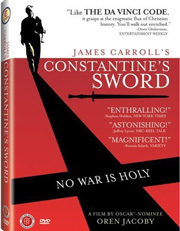 I just finished watching James Carroll’s “Constantine’s Sword” in class, a film by Oren Jacobs. It punches you in the gut with a treatise on the atrocity of the Christian church’s endorsement of hatred and violence through the years.
I just finished watching James Carroll’s “Constantine’s Sword” in class, a film by Oren Jacobs. It punches you in the gut with a treatise on the atrocity of the Christian church’s endorsement of hatred and violence through the years.As it neared ending, I could feel the tears burning the back of my eyes, and my stomach lurched. I’m tired from carrying the weight of this knowledge.
One of the main veins of injustice Carroll traces is the oppression of Jews as “Christ killers”. Along the journey, he interviews a dear old Jew who lost his entire family in Auschwitz. I’ve walked the pathways of Auschwitz. Cried as I discovered the inhumanities committed there against people. Auschwitz was the largest network of German death camps under the Nazi regime (and allowed by the Christian church…). It became the final resting place for hundreds of thousands of Jews, including many Christians of Jewish ethnicity.
Near the end, the film begins to trace a continuation of the patterns of injustice and violence into today with the war against terrorism, a war being fought in the name of freedom—a “God-given right”.
It also makes me think of our opinions and involvement on the conflict between Israel and Palestine.
Don’t get me wrong, I understand there are people that are evil and are a threat even to their own people, not just our nation. But I wonder how often we go in with a hero mentality, going in thinking we know best and will push our will upon others because it’s the right way. Perhaps we should take more time to listen, should go in to only support what others are doing.
(Disclaimer: I don’t think I know near enough to really talk intelligently about all this, so please grant me the grace of listening to my tears even if the expression comes rough around the edges…)
Tying back to a comment from class on Tuesday, I can’t help but wonder what our Iraqi brothers and sisters in Christ, our Palestinian brothers and sisters in Christ, think about our involvement and our stances.
God, save us from ignorance, misunderstanding, and even outright misuse of our faith when it comes to power, politics, and faith. We often feel we are the oppressed, but I would argue there are others far more oppressed and we perhaps are the oppressors.
P.S. You should watch the movie. http://constantinessword.com/?page_id=122